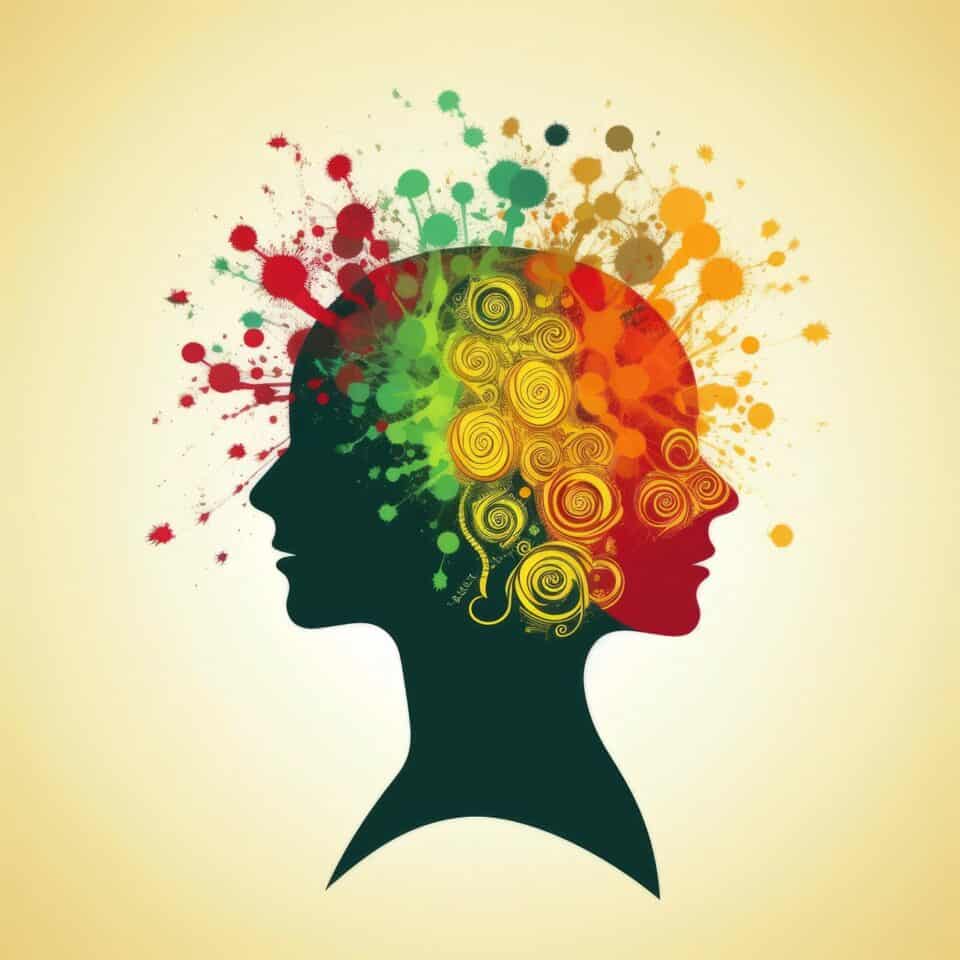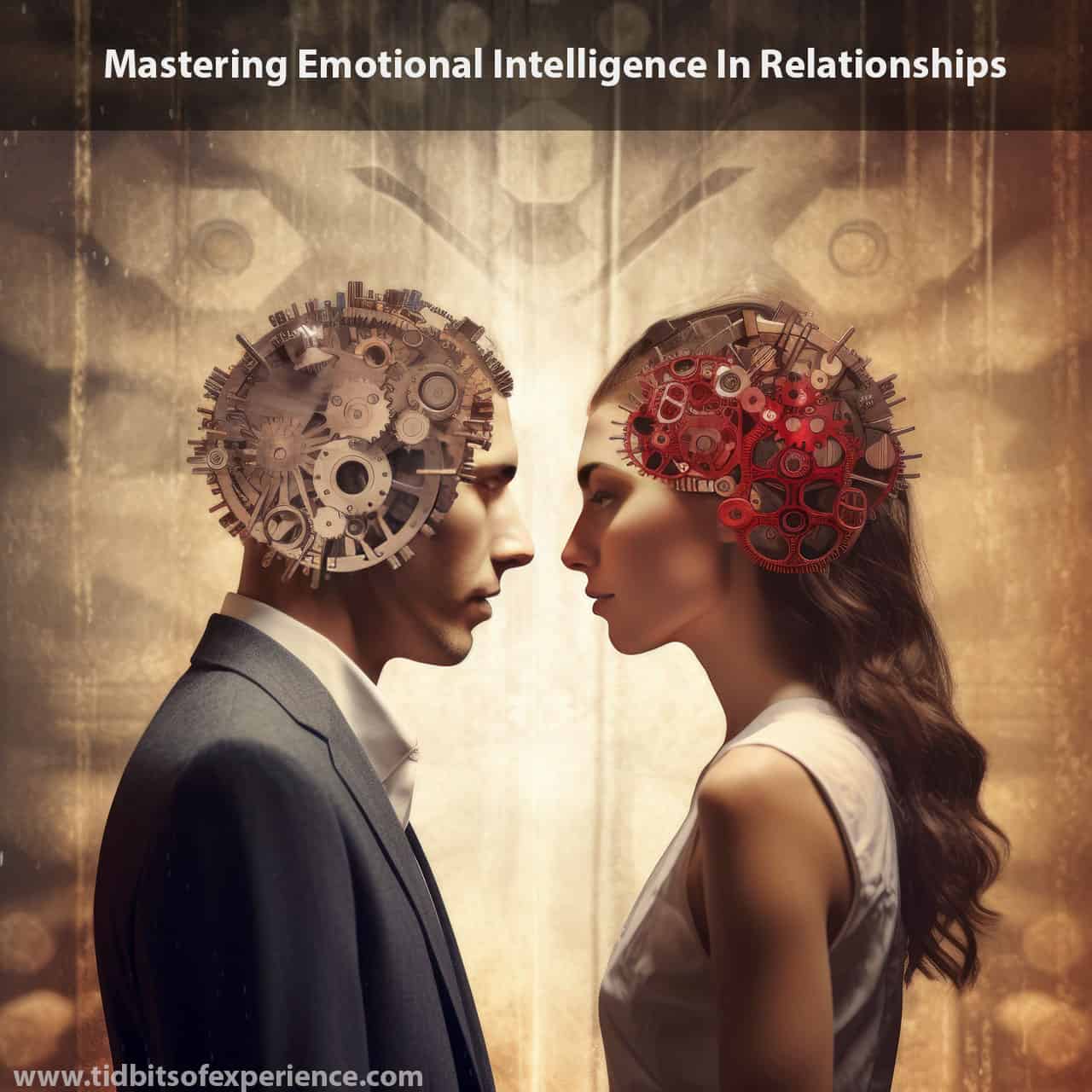Building and maintaining a healthy, lasting romantic relationship can be challenging in today’s fast-paced world. One crucial factor that often goes under the radar is emotional intelligence (EQ), which plays a vital role in fostering love and happiness.
Did you know that EQ can predict 37% of marital satisfaction? In this blog post, we’ll delve into understanding emotional intelligence in relationships and explore how mastering these skills can lead to stronger communication and deeper intimacy and ultimately pave the path for enduring love.
Mastering Emotional Intelligence In Relationships (Key Takeaways)
- Emotional intelligence (EQ) fosters love and happiness in relationships.
- Developing emotional awareness, empathy, improved communication, and self-regulation are essential skills to master EQ in a relationship.
- Mastering emotional intelligence can lead to stronger communication and deeper intimacy and pave the path to enduring love.
- Couples with higher levels of emotional intelligence tend to navigate conflicts more effectively and build greater trust and intimacy throughout their partnership.
Table of Contents
Understanding Emotional Intelligence In Relationships

Emotional intelligence in relationships refers to one’s ability to recognize and manage their own emotions and those of others, leading to healthier communication, conflict resolution, and overall relationship satisfaction.
Defining Emotional Intelligence
Emotional intelligence, often referred to as EQ, is the ability to recognize, understand, and manage your own emotions and those of others. It plays a crucial role in connecting with people around us and is especially important in maintaining healthy relationships with our loved ones.
For example, imagine that you notice your spouse seems upset after a long day at work. A wife with high EQ could quickly identify her partner’s negative emotions and empathize with him by offering support or simply listening without judgment.
Developing emotional intelligence involves honing skills like self-awareness (recognizing your own feelings), self-regulation (keeping your emotions under control), social awareness (understanding the emotions of others), and relationship management (handling complex interpersonal dynamics successfully).
The Importance Of Emotional Intelligence In Relationships
Emotional intelligence is crucial to building and maintaining a strong, healthy relationship. As wives, understanding our own emotions allows us to be more supportive and empathetic partners.
The importance of emotional intelligence in relationships cannot be overstated. It enables you to recognize your partner’s needs and emotions accurately while providing genuine support during happy and challenging times.
For example, an emotionally intelligent wife knows when her spouse needs encouragement after a hard day at work or may sense unspoken tension requiring an open conversation for resolution.
Impact Of Emotional Intelligence On Communication, Conflict Resolution, And Intimacy
Emotional intelligence plays a crucial role in enhancing the quality of communication, conflict resolution, and intimacy within relationships. For instance, an emotionally intelligent wife can easily recognize her partner’s emotions and respond accordingly.
Being adept at managing your own emotions is another vital aspect of emotional intelligence that smoothens the path to effective conflict resolution. When disagreements arise between partners, those with high EQ are likelier to stay calm under pressure and avoid reacting impulsively.
As you develop stronger emotional intelligence skills within yourself as a wife, you’ll discover that cultivating intimacy becomes more accessible than ever before. An emotionally intelligent couple shares physical attraction and an unshakable bond built on mutual understanding, respect, and appreciation for each other’s unique strengths and quirks.
This form of deep-rooted affection blossoms from accurately perceiving one another’s emotions – be it joy or sorrow – while providing unwavering support during life’s ups and downs.
Building Emotional Intelligence Skills In Relationships

Developing emotional awareness is crucial in building emotional intelligence skills for successful relationships.
Developing Emotional Awareness
To master emotional intelligence in your relationships, it’s essential to first develop emotional awareness. This means being able to identify and understand your own emotions, as well as recognizing and empathizing with the feelings of others.
One way to develop this skill is by paying attention to bodily sensations such as tension or relaxation, which can help you tune into your emotions.
Another important aspect of developing emotional awareness is identifying triggers that may cause intense emotions or reactions. For example, if you know that stress at work tends to cause you to feel anxious or irritable later in the day, knowing this trigger can help you manage those feelings before they escalate and impact your relationship.
Practicing Empathy And Compassion
It is important to practice empathy and compassion to build emotional intelligence skills in relationships.
One way to develop these skills is by actively listening and trying to understand the other person’s point of view. For example, if your partner had a bad day at work, instead of dismissing their feelings or offering solutions immediately, try empathizing with them by saying things like “I’m sorry you had a tough day” or “That sounds really frustrating.”
Another way to build empathy is by engaging in causes that are close to your heart. Volunteering for a community project or donating to a charity can help you see things from different perspectives and make meaningful contributions towards a cause you care about.
In turn, this can increase your ability to empathize with others who may be going through similar experiences.
Improving Communication Skills
Good communication is essential for any healthy relationship, especially between partners. Fortunately, there are several things wives can do to improve their communication skills with their significant others:
- Listen actively: Focus on what your partner is saying instead of just waiting for them to finish so you can respond. Active listening involves paying attention, asking questions, and clarifying points.
- Speak clearly: Be clear and direct when you are communicating your thoughts and feelings. Speak in a calm tone of voice instead of becoming emotional or defensive.
- Use “I” statements: Instead of blaming or accusing, use “I” statements that focus on your own feelings and experiences. This helps your partner understand where you are coming from without feeling attacked.
- Practice empathy: Put yourself in your partner’s shoes and imagine how they might feel in a particular situation. This helps build understanding and trust in the relationship.
- Avoid negative language: Criticizing or insulting your partner will only lead to defensiveness and hurt feelings. Try to use positive language instead, focusing on what you appreciate about your partner.
By improving your communication skills through these techniques, you’ll be better equipped to handle conflicts and misunderstandings with your significant other. Effective communication is one key component of emotional intelligence that can help build lasting love and happiness in relationships.
Building Self-Awareness And Self-Regulation
Developing self-awareness and self-regulation is essential for mastering emotional intelligence in relationships. Self-awareness involves recognizing and understanding your own emotions, thoughts, and behaviors.
For instance, if you notice that you tend to get defensive whenever your partner brings up a particular topic, it could indicate that the issue triggers some unresolved emotional baggage on your part.
Similarly, self-regulation entails effectively managing one’s thoughts and actions when dealing with challenging or triggering circumstances. This means learning how to pause before reacting impulsively in stressful situations – like taking a few deep breaths or counting backward from ten before responding.
Applying Emotional Intelligence In Relationships

By applying emotional intelligence in relationships, couples can better manage conflicts, build and maintain trust, increase communication effectiveness, and cultivate deeper intimacy.
Managing Conflict
Conflict is inevitable in any relationship, but managing it can make all the difference. As a wife, here are some tips for managing conflict with emotional intelligence:
- Listen actively: When conflicts arise, listen actively to your partner’s perspective without interrupting or getting defensive.
- Focus on finding a solution: Instead of assigning blame or becoming defensive, focus on finding a solution that addresses both of your concerns.
- Use “I” statements: Avoid making accusatory statements and instead use “I” statements to express how you feel about the situation.
- Practice empathy: Try to see things from your partner’s point of view and validate their feelings, even if you disagree with them.
- Take a break if necessary: If emotions run high, take a short break to cool down before continuing the discussion.
Managing conflict with emotional intelligence can strengthen your relationship and increase intimacy. Not only that but being emotionally intelligent in conflict management can also positively impact other areas of life, like the workplace. Remember that mastering emotional intelligence is an ongoing process but can lead to lasting love and happiness in relationships.
Building And Maintaining Trust
Trust is a fundamental aspect of any healthy and successful relationship and plays an important role in emotional intelligence. When we trust our partners, we feel secure and comfortable sharing our deepest emotions with them.
Building trust can take time, but it is vital for a lasting and fulfilling partnership.
Maintaining trust requires open communication, honesty, and mutual respect. It’s essential to keep promises made to each other, no matter how small they might seem. When you make mistakes or break promises unintentionally, being accountable for your actions can help rebuild the lost trust.
Improving Communication
Building excellent communication skills is critical to improving emotional intelligence in relationships. Communication helps couples understand each other better, promote intimacy and resolve conflicts effectively.
The first step to improving communication is developing active listening skills.
One way of promoting active listening is by paraphrasing what your partner said back to them. It shows that you paid close attention and reinforces the message being communicated.
Couples should also strive to communicate their feelings honestly, assertively but respectfully, avoiding criticism or defensiveness while communicating.
Important facts: Emotional intelligence can only be built through an intentional practice of empathy-building exercises like giving a sincere compliment daily, showing gratitude for something specific about your relationship every day, or practicing mindfulness meditation together as a couple on a regular basis could further improve EQ levels remarkably making way for healthier relationships with fewer episodes of stressors less likely to interfere with bonding efforts long term leading towards deeper connections emotionally providing mutual joy and happiness within partnerships over time!
Cultivating Intimacy
To cultivate intimacy in a relationship, it’s important to start with emotional awareness. This involves being present and attuned to your own emotions and your partner’s.
Effective communication is also crucial for developing intimacy. It means talking openly and actively listening to your partner without judgment or interruption.
Intimacy can take many forms; physical touch is just one aspect. Emotional closeness can be achieved through shared experiences such as traveling or trying new hobbies together.
Taking the time to nurture these types of connections helps strengthen relationships over the long term by increasing satisfaction levels and promoting lasting love and happiness.
The Benefits Of Mastering Emotional Intelligence In Relationships

Mastering emotional intelligence in relationships leads to increased relationship satisfaction and happiness, improved communication and conflict resolution, greater emotional connection and intimacy, and success in long-term relationships.
Increased Relationship Satisfaction And Happiness
Mastering emotional intelligence in relationships can significantly increase relationship satisfaction and happiness. When both partners are emotionally intelligent, they understand each other’s needs better and respond more thoughtfully to them.
They know how to manage their emotions during conflicts, empathize with each other’s feelings, communicate effectively, and cultivate intimacy. For example, a husband with high emotional intelligence would take the time to listen attentively when his wife expresses her feelings about an issue without interrupting or judging her.
Research shows that couples with high levels of emotional intelligence report less stress in their relationships and feel happier overall than those without this skill set.
Improved Communication And Conflict Resolution
One of the most important benefits of mastering emotional intelligence in relationships is improved communication and conflict resolution. When we develop our emotional intelligence skills, we become better equipped to understand and manage our own emotions and those of our partners.
Furthermore, developing emotional intelligence skills such as empathy and compassion allows us to be more understanding of our partner’s perspective during conflicts.
Instead of getting defensive or shutting down, we can approach disagreements with an open mind and work together toward finding a solution that works for both parties.
Greater Emotional Connection And Intimacy
Regarding relationships, emotional intimacy is crucial in building a strong connection between partners. The way individuals communicate and express their emotions allows them to feel safe and secure in their relationship.
For example, if your spouse is feeling stressed or anxious about something going on at work, you can use your emotional intelligence skills to comfort them by asking how they’re doing or offering words of support.
By validating their feelings and showing empathy for what they’re experiencing, you create an atmosphere of trust that allows both of you to connect on a deeper level emotionally.
Success In Long-Term Relationships
As wives, we all wish for our relationships to stand the test of time. Emotional intelligence plays a vital role in achieving this, and here’s why: emotionally intelligent couples are more likely to resolve conflicts constructively and maintain emotional stability during difficult times.
When disagreements arise between partners with high EQ, they can approach them calmly and respectfully instead of resorting to hostility or passive-aggressive behavior. Additionally, emotionally intelligent husbands tend to be better listeners and more supportive when their wives need it most.
By developing these skills together as a couple, you can strengthen your partnership over the long term while also benefiting from greater intimacy and deeper connection with one another.
Frequently Asked Questions (About Emotional Intelligence In Relationships)
What is emotional intelligence in relationships, and why is it important?
Emotional intelligence refers to the ability to understand and manage your own emotions and recognize and empathize with the emotions of others. This means communicating effectively, resolving conflicts healthily, and demonstrating empathy toward your partner’s feelings in relationships. Developing emotional intelligence can lead to stronger, more fulfilling relationships.
How can I improve my emotional intelligence in my relationship?
Practicing active listening, expressing your emotions clearly and calmly, taking responsibility for your own actions and reactions, and practicing empathy towards your partner’s feelings are some ways you can improve your emotional intelligence within a relationship.
Can two people have different levels of emotional intelligence in a relationship?
Yes, it is possible for partners to have different levels of emotional intelligence. One person may naturally be better at managing their emotions while the other struggles with communication or handling conflict situations- however, one must also keep in mind that everyone has strengths & weaknesses when it comes to EI – a growth mindset helps.
If my partner lacks emotional intelligence skills but refuses help or support from me or professionals – what should I do?
If you feel like your partner’s lack of EI skills is causing distress & impacting the quality of life together, then suggesting professional counseling could benefit both parties involved. If they refuse help altogether – showing patience & empathy while practicing your own coping mechanisms will give them room to feel safe enough to come around on their terms rather than feeling forced into something they’re not ready/comfortable starting yet.
Conclusion
In conclusion, emotional intelligence is key to lasting love and happiness in relationships. Couples can navigate conflicts more effectively and build trust and intimacy by developing emotional awareness, empathy, improved communication, and self-regulation skills.
Emotionally intelligent partners can better connect emotionally with their significant others and maintain supportive friendships throughout their partnership. For wives looking to cultivate a healthy relationship that stands the test of time, mastering emotional intelligence is essential for achieving success in their romantic life.
